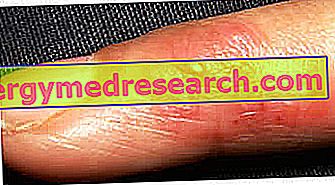
Scientific name
Viscum album
Family
Loranthaceae
Origin
central Europe
Used Parts
The drug consists of the whole plant (berries and young branches)
Chemical constituents
- Acetylcholine;
- Choline;
- Lectins;
- Polypeptides (viscotoxins);
- Organic acids;
- alkaloids;
- Flavonoids;
- Lignans;
- triterpenes;
- Saturated fatty acids;
- C vitamin;
- Mucilage.
Mistletoe in Herbal Medicine: Mistletoe Properties
Mistletoe is a plant appreciated as an ornamental, since, being very toxic, it is not recommended in the herbalist / phytotherapic field. In any case, considering the toxicity very carefully, the mistletoe is used against hypertensive states of various origins, since it is considered able to eliminate the subjective symptomatology.
The herbaceous parts contain glycoproteins and toxins with antitumor and immunostimulant properties, available as drugs for antineoplastic therapy, to be administered parenterally.
Biological activity
Although mistletoe is considered a toxic plant, several properties are ascribed to it. In particular, it is believed that this plant is endowed with antihypertensive, anti-inflammatory, immunostimulant and even anti-tumor activity.
The antipertrensive action is ascribed above all to the flavonoids, to the lignans and to the amines contained in it and it seems that it is exercised through the reduction of the peripheral resistances. Although this therapeutic use of mistletoe has not been officially approved, it is not uncommon for this plant to be included in the composition of phytotherapeutic preparations with indications for the treatment of mild hypertensive states.
However, if you suffer from hypertension, before taking any type of remedy, it is always good to consult your doctor and avoid self-therapy.
The anti-tumor properties of mistletoe, on the other hand, are a topic that is still much debated in the scientific field. In fact, some studies carried out in this regard affirm that the mistletoe extracts - in particular, the lectins contained in them - are able to exert an antineoplastic action through different mechanisms, such as: the stimulation of the patient's immune system by increasing the production of T lymphocytes, increased activity of Natural Killer cells and induction of apoptosis in malignant cells.
Still other studies - conducted on patients suffering from different types of tumors - state that the intake of mistletoe extracts can improve the quality of life of cancer patients and can be useful in decreasing the side effects caused by anticancer chemotherapy.
A recent study (2014) conducted in vitro on breast cancer cell lines has instead shown that the concomitant administration of doxorubicin and lectin extracted from mistletoe gives rise to a remarkable synergistic effect, causing an inhibition of malignant cell growth greater than the inhibition given by the two molecules administered individually.
On the other hand, other authors state that the studies carried out on the anti-neoplastic properties of mistletoe are not sufficient to confirm the real therapeutic efficacy and some argue that, instead, the use of mistletoe in the treatment of tumors could cause serious damage.
However, in some European countries (such as, for example, Switzerland), mistletoe is used in preparations that are used as adjuvants in conventional cancer therapy.
Mistletoe in folk medicine and homeopathy
In folk medicine, mistletoe is used to treat different types of disorders.
The mistletoe fruit is used as a tonic and expectorant remedy and is also used for the treatment of arteriosclerosis, internal bleeding, gout and epilepsy.
To the stem of the mistletoe, instead, traditional medicine attributes calming properties and for this reason it uses it in the treatment of states of anxiety, agitation and hyperexcitability.
Other unapproved uses of mistletoe involve the use of the entire plant - usually in infusions - for the treatment of diarrhea, whooping cough, asthma, amenorrhea, dizziness, nervousness and tachycardia associated with it.
Chinese medicine, on the other hand, uses mistletoe for the treatment of joint pain, tendon pain, muscle pain and lumbago, as well as using it as a remedy for vaginal bleeding in pregnancy and as a galactogogue remedy.
Mistletoe is also used in homeopathic medicine, where it can easily be found in the form of oral drops, granules and glyceric macerate. In this context the plant is used for the treatment of vertigo, hypertension, cardiac arrhythmias and as a remedy for joint degeneration.
Warnings
The mistletoe berries, if ingested, can cause vomiting and diarrhea up to the shock.
Side effects
Following oral intake of mistletoe preparations, side effects may occur, such as: fever, headache, chills, orthostatic hypotension, bradycardia and angina pectoris.
Furthermore, following the use of high-dose mistletoe preparations, mydriasis or miosis, hallucinations, delusions, nausea, vomiting, diarrhea and gastroenteritis may also occur.
Following the use of parenteral mistletoe extracts, on the other hand, there may be: slight rise in body temperature, headache, inflammation at the injection site, swollen lymph nodes and allergic reactions that may occur in the form of itching, local or generalized urticaria, rash, erythema multiforme, angioedema, chills, dyspnoea, bronchospasm and shock.
Mistletoe berries are toxic and, if ingested, can cause poisoning and cause epileptiform convulsions, vomiting and diarrhea up to shock.
Contraindications
Avoid taking the mistletoe in the event of hypersensitivity to one or more components.
Furthermore, the use of mistletoe is also contraindicated in patients suffering from chronic and progressive infections (such as, for example, tuberculosis or AIDS), hyperthyroidism, spinal cord tumors, intracranial tumors and tumors of the central nervous system.
Finally, the use of mistletoe is also contraindicated during pregnancy (since it is believed that the plant can exert an abortive action) and during lactation.
Pharmacological Interactions
Mistletoe and its preparations could interfere with the activity of drugs, such as:
- Anticoagulant drugs;
- immunosuppressant;
- Antidepressants.
Warnings
Some of the negative effects caused by the mistletoe are attributed to the lectins contained in it. In fact, these molecules cause the agglutination of red blood cells, especially following prolonged use.
For this reason and due to the toxicity of this plant, before taking mistletoe preparations, it is always good to consult your doctor.



